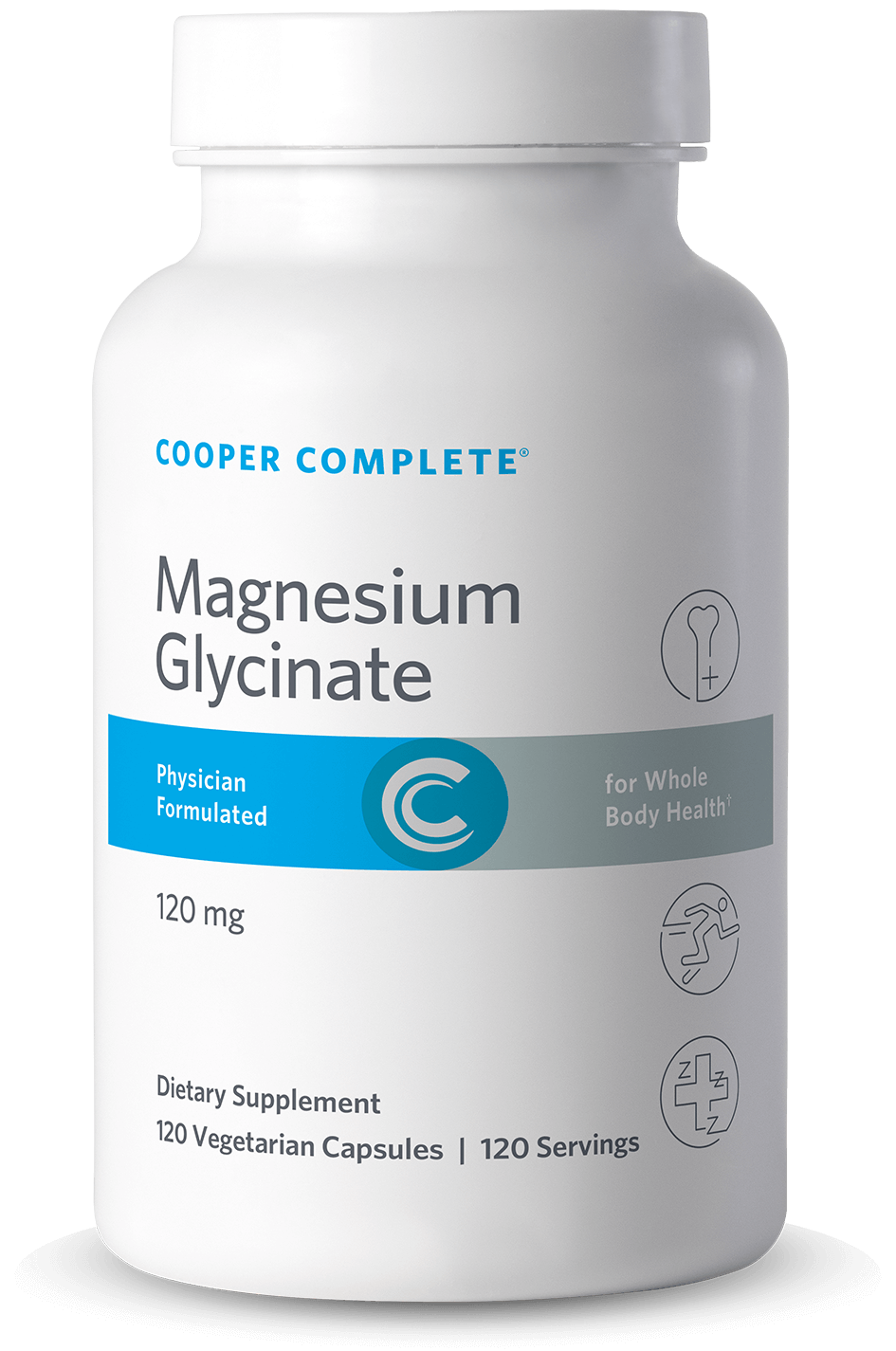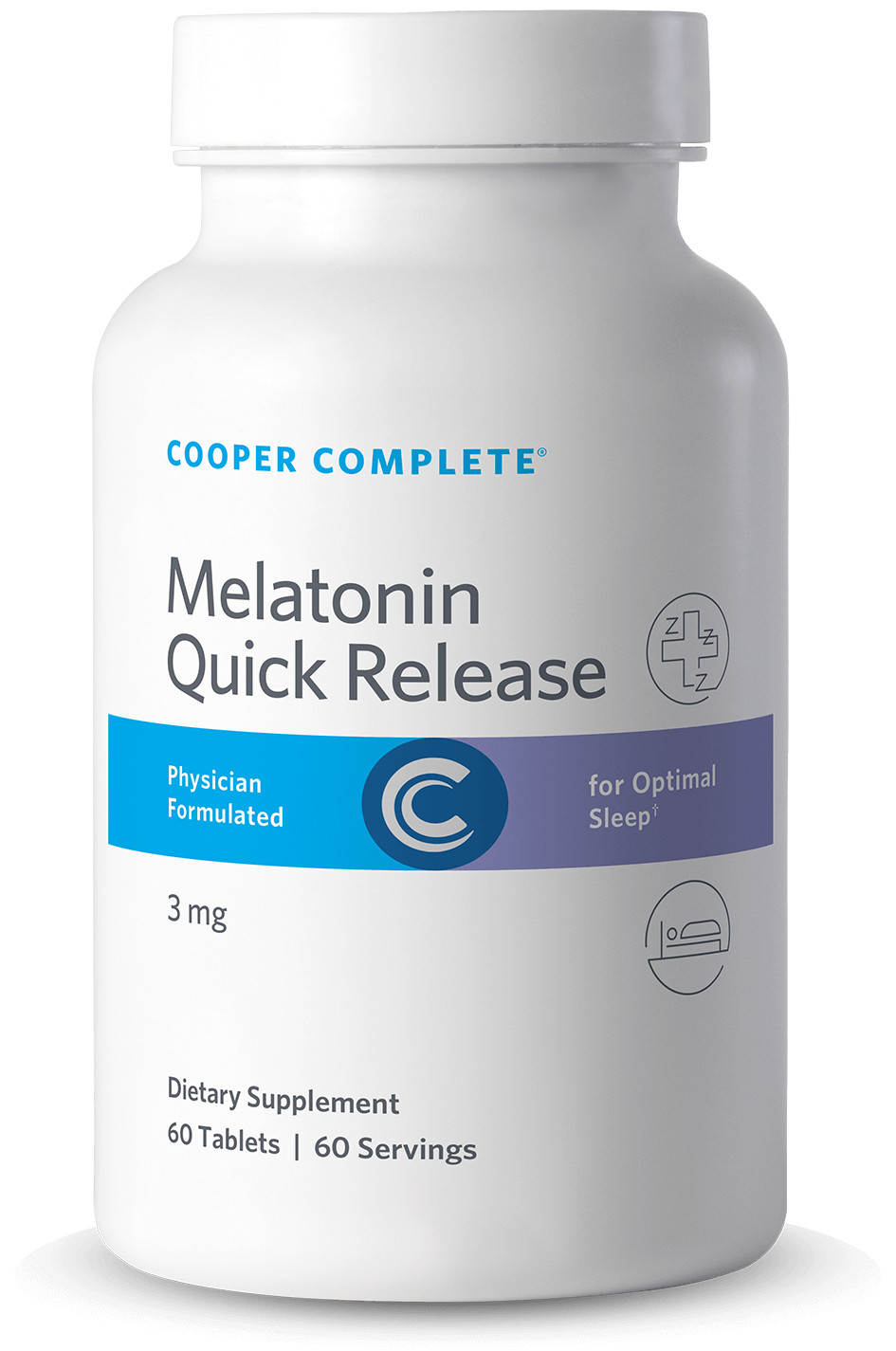Best Sleep Supplements and Latest Sleep Research

Getting a good night’s rest can be hard work. Stress, life change, travel, and sleep disorders are common contributors to tossing and turning. However, vitamin deficiencies have proven to be an overlooked culprit to poor sleep patterns and sleep quality. Research shows that natural supplements such as magnesium, melatonin, and iron can help you catch some quality zzzs. Cooper Complete© offers nutritional supplements to help fill in any gaps in your diet that may be associated with poor sleep.
The National Institutes of Health (NIH) recommends adults get seven to eight hours of sleep each night. Yet, nearly 30 percent of adults report an average of six or fewer hours of sleep on a regular basis. The Centers for Disease Control and Prevention (CDC) has deemed insufficient sleep a public health epidemic. Findings show sleeping 90 minutes less decreases daytime alertness by 32 percent. The National Sleep Foundation created a sleep recommendations chart to educate the public on suggested levels of sleep for individuals of all ages. However, this number does not account for the time it takes to fall asleep.

120 mg Magnesium Glycinate Supplement
Chelated magnesium glycinate (also known as magnesium bis-glycinate) is well absorbed without significant laxative effects.
$24.98 Add to cartMagnesium To Relax And Help Improve Sleep Regulation
Studies show that Magnesium plays a key role in the body’s sleep regulation. The U.S. Department of Agriculture reports that people with persistent sleep issues often have low magnesium in their blood. To help improve magnesium levels naturally, Cooper Complete© offers magnesium supplements along with a variety of multivitamins containing magnesium and other nutrients to support sleep health.
In a recent study, 100 adults took 320 mg of magnesium citrate each night. Altogether, subjects reported a 37 percent improvement in sleep quality (based on self-reported feedback) compared to the placebo group.
Magnesium helps quiet the mind and body, making it easier to fall asleep. It also increases the neurotransmitter gamma-aminobutyric acid (GABA) in the brain, which inhibits certain brain signals to your nervous system inducing calming effects.
Foods That Can Help Improve Magnesium Levels
Magnesium levels can also be increased by consuming foods such as:
- Whole grains
- Nuts – especially almonds
- Legumes
- Leafy vegetables
- Low-fat milk
Melatonin Supplements to Improve Sleep Disturbances
Melatonin is a hormone produced naturally in the body which aids in determining sleep and wake cycles. Light affects melatonin production, which allows its levels to rise in the evening as it gets dark, enabling you to sleep through the night. Melatonin can be found in small amounts in meats, grains, and fruits and vegetables, but melatonin supplements also help with sleep disorders such as:

3 mg Melatonin Quick Release Supplement
Quick Release Melatonin promotes restful sleep patterns and supports falling asleep faster.† Melatonin supports normal sleep/wake cycles, healthy immune function and antioxidant activity.†
$17.98 Add to cartJet Lag: In several human studies, travelers who took melatonin for several days during and after their trip reduced the time it took to re-establish a normal sleep pattern. Overall, melatonin provides benefits for about half the people.
Delayed Sleep Phase Syndrome is the scientific term for delayed weekend sleep patterns also known as DSPS. In one study, results revealed the time to fall asleep decreases from 60 minutes to 20 minutes when taking melatonin.
Insomnia in the Elderly: Several human studies find benefits to taking melatonin before bedtime. For example, melatonin sleep supplements reduce the time needed to fall asleep in elderly individuals with insomnia. In addition, improved sleep quality and morning alertness were results of using sleep supplements. Unfortunately, the studies were short in duration.
Iron levels and sleep duration
Iron deficiencies can lead to restless leg syndrome, making it difficult for the body to remain still while trying to fall asleep, and can prevent you from sleeping through the night. A cohort study of 12,614 Chinese adults (aged 18-98 years) found an association between lower iron intake and sleep of fewer than 5 hours at night after controlling for diet. Another study, the English Longitudinal Study of Ageing, with 6,465 adults (aged 50-99 years), found low hemoglobin associated with short and disturbed sleep.
Improving Iron levels naturally
Taking an iron supplement may help sleep quality. Consider adding iron-rich food to your diet, such as:
- Liver
- Red meat, pork, and poultry
- Beans
- Dried fruit
- Dark leafy green vegetables such as spinach
Insufficient Sleep and Metabolism
The science linking sleep and weight gain is increasingly telling. Overall, the fewer hours people sleep, the more they are found to weigh. Several biological reasons support this:
- Ghrelin is the “appetite” hormone. It signals the brain that it is time to eat. If you are not getting enough sleep, your body produces more ghrelin.
- Leptin is the “fullness” hormone. Leptin tells your brain you are full. In addition, when your leptin levels plummet from sleep deprivation, your brain is slow to receive the cue to stop eating.
- According to the Harvard Women’s Health Watch, chronic sleep deprivation may cause weight gain. Lack of sleep changes how the body processes and stores carbohydrates and alters hormone levels.
- A University of Chicago study discovered lack of sleep reduced the response to insulin. Low energy and an increase in weight result from a lower response.
Lack of sleep increases blood pressure and cortisol
- In a University of Chicago study, participants slept only four hours per night for six days in a row. As a result, they developed high blood pressure and higher levels of the stress hormone cortisol. In turn, all changes were successfully reversed once the participants returned to the recommended 6-8 hours of sleep.
Getting enough sleep is not a luxury—it is essential for good health. If you are not getting enough natural supplements of magnesium, melatonin, and iron in your diet, Cooper Complete can help. Be sure to consult your health care provider or physician who understands your health profile best before taking any sleep supplements. Discuss which supplements would best for you and how various sleep supplements might affect pre-existing health conditions.
